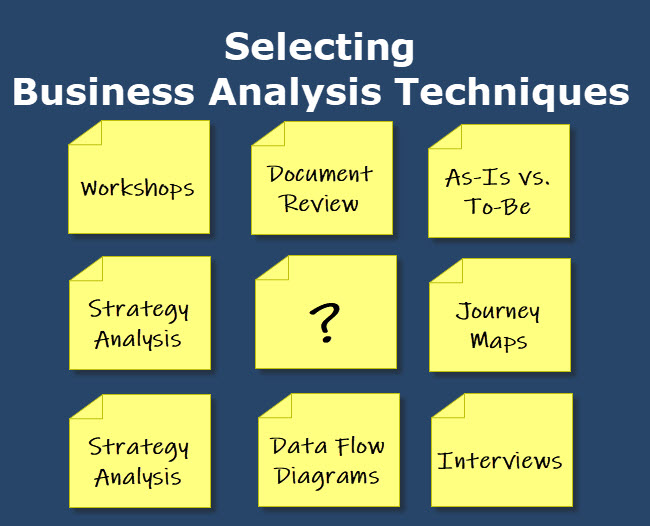It is true that a structural element of the conceptual framework of the BABOK knowledge areas is tailoring. The philosophy that a specific sequential approach does not fit in all circumstances is clear across all the knowledge areas and techniques presented. A business analyst has to critically filter and pick up the most useful techniques and approaches given the specific circumstances.
Except just selecting a technique or approach innovations on the processes and methodologies themselves can add value the whole business analysis effort in the spectrum of a specific project or of the whole day to day operation of a business analysis department of team. Every technique and approach as much as generic and catholic shall be in order to be perceived as an approach or methodology shall allow flexibility in order the business analyst to use it in the context of the special conditions the most of value.
The internal and external conditions are complex, interdependent and unique. Either the change of only an internal or external component creates a different dynamic and a different system and may trigger a chain of events that can affect indirectly other components. The “Ceteris paribus” assumption in some microeconomics models seems to be utopic in the modern business environment. The systemic view, the wholeness view and the holistic approach are basic characteristics for an effective analysis of the approach and technique that is going to be used in a business analysis task.

Another parameter before selecting an approach or technique or modifying it is the organizational standards and policies that currently exists. The way that the organization selects to make specific things as a result of the accumulated experience and knowledge shall be taken into consideration. However as continuous inputs are gained from external knowledge sources the internal knowledge tank is developed and the tactics and procedures are revised after new “furnish evidence” circulate inside the organization’s knowledge venations. Lessons of the past play a detrimental role in the selection, tailoring and modification process as well as the SMEs advice and recommendation and managerial wisdom.
Let’s see some examples below of tailoring occasions:
- Workshops may be the elicitation technique is used in your organization but in a specific client this method does not work and the most appropriate way for eliciting requirements is through document analysis as the basic parts are retired from the company
- Requirements may be only needed to be depicted in diagrams as the development team does not require any formal documentation
- The phase of strategy analysis is surpasses as customer has made this part on its own and only requires the development of a part of the solution
- Τhe detailed project plan and phases shall be finalized once a full set of gap analysis and requirements is structured in order the planning to be depicted in realistic terms.
Lead Business Analysts formulate the business analysis generic strategies that respond to the external driving forces and reflect the principle of flexibility and tailoring concerning the project specific conditions.
Continuous creative dispute of processes and methodologies in the area of business analysis enable the creation of new opportunities and capabilities to reinvent the whole field and improve an organization’s specific response to client’s needs
Opportunities to achieve superior outcomes in the business analysis efforts of an organization derives from enterprise and strategic thinking, visionary leadership, a solid understanding of the business environment, knowledge of the internal organization, innovation, and integration, and insights and creativity. The organization’s business analysis standards definition is an ongoing dynamic wherein corporate leaders formulate, implement, manage, and evaluate the expectations and outcomes that continuously affect the “as-is” processes and direction of the business analysis standards.
It is a high-level responsibility of management, especially senior executives of a business analysis department to ensure that the future is brighter than the present. The strategic business analysis management process incorporates the analysis of the business environment, an evaluation of the prevailing strategies of successful organizations in business analysis, the formulation and implementation of revised and new tactics, approaches, and techniques, the development of initiatives and programs, and the governance of the business analysis department and its processes and approaches.
Expect the upper management every one employee regardless the position can introduce new ideas and challenge the existing standards. If senior management is open to a bottom up flow of information many proposals and new approaches can be utilized and become part of a new organization level policy, approach and practice. The change makers are the ones who ask more questions, challenge the existing status quo, listen carefully the external feedback and trends, offer more solutions, and have courage and determination to cultivate change.
As observation and curiosity is the backbone of the business analysis, business analysts shall use their skills for the improvement of the processes, policies, informal and formal practices and tactics that are used in their workplace and their department.
In a nutshell no approach a technique shall be used a priory without critically evaluating the special conditions of the initiative both from internal and external environment. A careful selection and maybe a customization is recommended against the adoption of techniques and frameworks as panacea.
 Author: Giorgos Sioutzos ITIL, CCBA, PRINCE2 – Business Analyst, Consulting Industry | CCBA
Author: Giorgos Sioutzos ITIL, CCBA, PRINCE2 – Business Analyst, Consulting Industry | CCBA
Giorgos Sioutzos is working in the business consulting industry as a business analyst. He has experience in projects from different sectors. He holds a BSc in Management Science and Technology from Athens University of Economics and Business and Msc in International Business & Management. Numerous articles about business and technology issues have been published in most reputable Greek and foreign media.